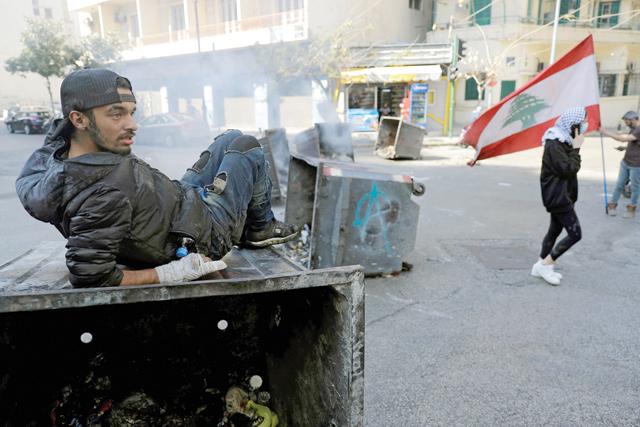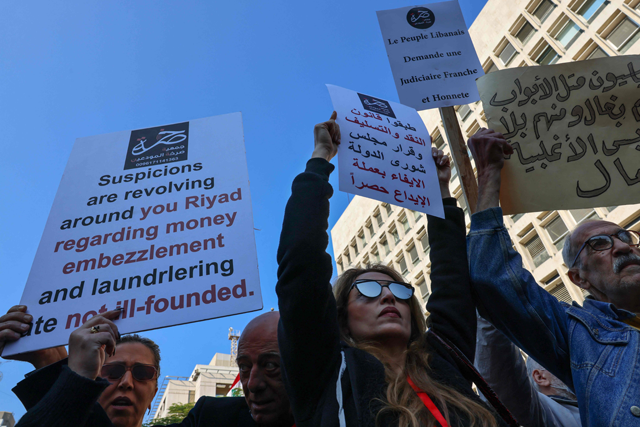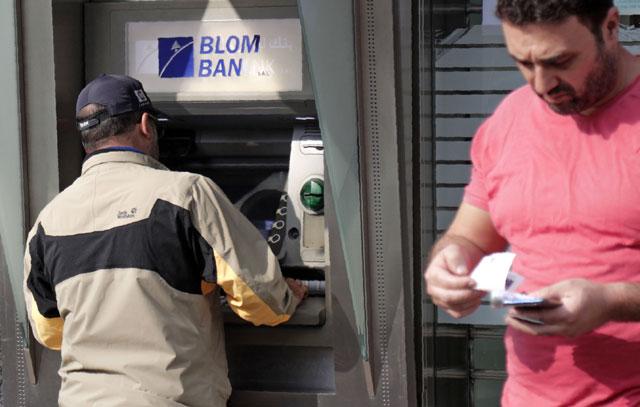You are here
Lebanon protesters try to storm ministry over currency crisis
By AFP - Mar 17,2021 - Last updated at Mar 17,2021

Anti-government demonstrators block the street, with burning garbage dumpsters, in front of Lebanon's central bank in the capital Beirut on Tuesday, during a protest against the deteriorating economic situation (AFP photo)
BEIRUT — Lebanese protesters briefly attempted to storm the economy ministry on Wednesday to denounce exploding prices of basic goods as the local currency collapses.
Around 20 protesters had gathered outside the ministry's Beirut headquarters a day after the Lebanese pound hit a new-low of 15,000 to the greenback, according to an AFP correspondent.
Some tried to enter the building, causing tension with security forces, the official National News Agency reported.
"We are killing each other for a bag of diapers and a carton of milk," one protester told a local TV station.
The political class "have humiliated us", he said, denouncing hikes in consumer prices which rose by almost 146 per cent during 2020, according to official statistics.
Later in the afternoon, demonstrators tried to march towards the presidential palace outside Beirut but they were stopped by security forces.
Others blocked several key roads across the country with burning tyres and torched garbage bins.
Lebanon is in the grips of its worst economic crisis since the 1975-1990 civil war.
The pound, officially pegged at 1,507 to the greenback since 1997, has lost almost 90 percent of its value on the black market.
It was changing hands for around 14,000 to the dollar on Wednesday.
Outgoing finance minister Ghazi Wazni on Wednesday met with central bank chief Riad Salameh who recently returned from France.
During the meeting, Salameh offered suggestions to “decrease the exchange rate”, according to a finance ministry statement.
The ministry and the central bank would review his proposal within the next 24 hours, the statement said.
Also on Wednesday, the head of the syndicate of fuel distributers, Fadi Abou Chacra, announced a new increase in petrol prices, already rising on global price hikes, NNA reported.
With the latest increase, the price of petrol has climbed by around 49 per cent since July.
Lebanon’s crisis is also eating away at the country’s dwindling foreign currency reserves which have so far funded subsidies on key goods such as fuel, flour and medicine.
The diminishing funds are cornering the government into cutting such support, which will push more of the population into poverty.
Some 55 per cent of Lebanese live below the global poverty line of 3.84 dollars a day, the United Nations says.
The country is also facing political deadlock, with no new government agreed some seven months after premier Hassan Diab resigned over an August 4 explosion that killed more than 200 people and disfigured swathes of the capital.
Related Articles
BEIRUT — Lebanese protesters on Wednesday blocked roads and burnt tires near the central bank in Beirut as the weakened local currency plumm
BEIRUT — Lebanon hiked fuel prices by more than 30 per cent Tuesday as it reduced subsidies that have eaten away at the central bank's forei
BEIRUT — Several petrol stations in protest-hit Lebanon stopped services on Saturday, as reserves ran dry due to a shortage of US dollars to


















